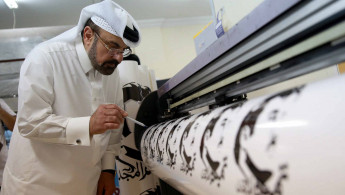Prolonged Qatar blockade has serious ramifications for wider region
On the surface, the Saudi-Emirati blockade of Qatar appears to be a relatively local isolation of a tiny country by much larger and powerful neighbours. However, its prolongation could exacerbate tensions across the wider region and its consequences won't necessarily be limited to the confines of the Gulf.
In June, the Qatari ambassador to the United States, Meshal bin Hamad al-Thani, declared that Doha "can continue like this [under blockade] forever".
To an extent he is correct. Early in the blockade, Iran and Turkey immediately rushed to Doha's aid: Tehran provided the country with necessities such as foodstuffs while Ankara beefed up its small military presence in the country, acting as a de-facto deterrent against any unilateral use of force by Riyadh or Abu Dhabi.
If the blockading states keep this up, Qatar will undoubtedly rely further on Iran and Turkey as trading partners to stave off the otherwise potentially crippling effects the blockade may have in the future.
 |
If the blockading states keep this up, Qatar will undoubtedly rely further on Iran and Turkey |  |
Egypt, Iran and Turkey are the region's predominant bellwether states. Egypt, because it is home to the region's largest Sunni Arab population and the highly influential Al-Azhar University. Iran, because it's home to the region's largest Shia population - and Turkey because it's a large non-Arab Muslim-majority peripheral state and the former centre of the Ottoman Empire, which historically governed most of the region.
Analysing trends in these three key countries can give some indication about which general direction the region is headed. In relation to the Qatar crisis, only Egypt is opposed to the tiny nation, primarily because Egyptian strongman President Abdel Fattah al-Sisi is closely aligned with the Saudis and Emiratis and staunchly opposes the Muslim Brotherhood - whose former representative was ousted as Egypt's first elected president by Sisi in a military coup.
Looked at from this perspective, Qatar has significant leverage, with support from two of the three of the region's major peripheral countries. This has the potential to lead to greater tensions between major regional powers the longer the blockade continues.
Read more from Paul Iddon
Turkish President Recep Tayyip Erdogan, who calls the emir of Qatar "my brother", has shown he values Ankara-Doha relations more than those with other Gulf countries. This doesn't necessarily mean he is ready to end Ankara's friendly relations with these other states, but shows he views Qatar as an ally for which he is willing to go great lengths to defend.
If the dispute is not soon resolved, a more permanent division may emerge which will make it harder for Turkey to effectively balance its relations between the blockading powers and its ally under siege.
 |
Emboldened by the regime change in Cairo they initiated what became a dress rehearsal for the current blockade, withdrawing their ambassadors from Qatar in early 2014 |  |
The blockade also has clear potential to exacerbate tensions between Ankara and Cairo, which began following the July 2013 coup. From the get-go, Erdogan - who, like Qatar, had friendly relations with the deposed Egyptian President Mohammad Morsi - bitterly denounced the coup and Sisi's subsequent rise to the presidency.
 |
| The Qatar-Saudi land border has been closed to all traffic and now stands almost deserted [AFP] |
Riyadh and Abu Dhabi, on the other hand, enthusiastically supported the coup. Perhaps emboldened by the regime change in Cairo they initiated what became a dress rehearsal for the current blockade, withdrawing their ambassadors from Qatar in early 2014 and issuing similar demands, albeit less broad and extensive, to Doha.
Qatar made some minor amendments to its policies and relations were subsequently restored.
This blockade is much more serious: Qatar has already sought to placate its neighbours' more legitimate demands by amending its counter-terrorism law, which Abu Dhabi acknowledged as a "positive step". Doha is unlikely to make any concessions on the other wide-ranging demands concerning media outlets or reparations to the Saudis - since meeting those demands would undercut, if not compromise altogether, its sovereignty.
If this isn't enough for the blockaders, then they could end up further entrenching existing divisions among the region's major powers, making any resolution much harder to achieve. Sisi's championing of the blockade and reported suggestion that it should be extended to include Turkey aptly illustrate the far-reaching consequences a long-term blockade of Qatar could yet have on the region.
Neither Ankara nor Cairo are likely to engage in any kind of negotiations or rapprochement while this crisis persists. Similarly, if Doha and Tehran forge closer ties, particularly in relation to trade and economic cooperation, the Gulf Cooperation Council (GCC), of which Qatar is a member, could be weakened.
Consequently, to avoid enflaming the wider region, the blockaders need to abandon their more unrealistic demands, work to find common ground and begin reversing the actions they initiated on June 5 before the crisis spirals completely out of control.
Paul Iddon is a freelance journalist based in Erbil, Iraqi Kurdistan, who writes about Middle East affairs.
Follow him on Twitter: @pauliddon


![President Pezeshkian has denounced Israel's attacks on Lebanon [Getty]](/sites/default/files/styles/image_684x385/public/2173482924.jpeg?h=a5f2f23a&itok=q3evVtko)



 Follow the Middle East's top stories in English at The New Arab on Google News
Follow the Middle East's top stories in English at The New Arab on Google News


